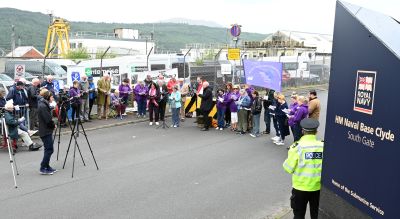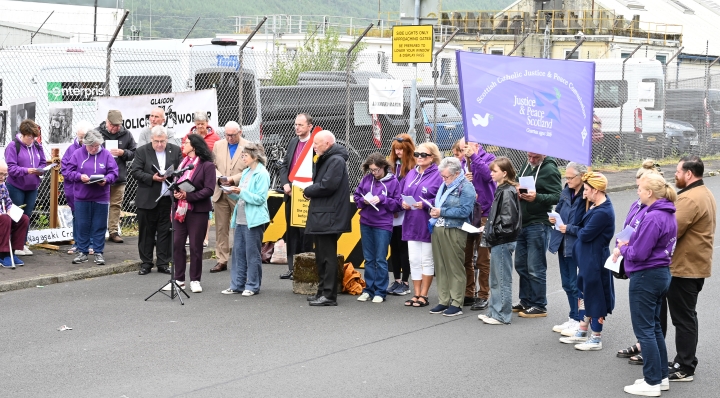Press Release: Christians to gather for Faslane peace vigil to say no to nuclear weapons

Download press release (pdf) here
More than 100 people will gather outside HM Naval Base on the Clyde to make a fresh call for a world free of nuclear weapons.
The peace vigil at Faslane on Saturday 2 August is being led by representatives of Scotland’s three largest Christian Churches and other faith groups to mark the 80th anniversary of atomic bombs being dropped on Japan.
It is estimated that 140,000 people in Hiroshima were killed and at least 74,000 people died in Nagasaki in August 1945, leading to the Japanese government surrendering on 2 September of that year, ending the Second World War.
The No To Nuclear Weapons peace gathering at the South Gate of the naval base on Maidstone Road from 10.30am to 12pm is being organised by Justice & Peace Scotland.
Most Rev William Nolan, Catholic Archbishop of Glasgow and Bishop-President of Justice & Peace Scotland, Rt Rev Rosie Frew, Moderator of the General Assembly of the Church of Scotland, and Most Rev Mark Strange, Primus of the Scottish Episcopal Church, are leading the event.
They will be joined by representatives from the Quakers, the Iona Community, the United Reform Church and more than 100 people of faith who will stand in solidarity to renew a shared commitment to the common good and the flourishing of creation.
The group will come together for prayer and reflection on the immorality of possessing nuclear weapons at a time when conflicts in the Middle East and Eastern Europe rage and the threat posed by these soon-to-be upgraded and expanded stocks in the UK is greater than in recent memory.
The current generation of such warheads – held by nine nations – is understood to be 80 times more powerful than those dropped in Hiroshima and Nagasaki.
 Archbishop William Nolan said: “The phrase ‘never again’ gained much currency 80 years ago.
Archbishop William Nolan said: “The phrase ‘never again’ gained much currency 80 years ago.
“But the actions of nuclear powers, including our own, run contrary to that.
“As the late Pope Benedict articulated, the very concept of a nuclear deterrence has instead fuelled an arms race as those on opposing sides keep seeking to outdo the other.
“We have seen this in the replacement for Trident. Deterrence itself, therefore, has increased insecurity and does nothing to build up trust which is necessary to encourage disarmament and build up peace.”
Located on the Gare Loch near Helensburgh, HM Naval Base Clyde is home to the Royal Navy's four Vanguard-class submarines – HMS Vanguard, Vengeance, Victorious and Vigilant – which each carry Trident 2 D5 nuclear missiles.
Described as Britain's nuclear deterrent and ultimate defence, they can be fired at targets up to 4,000 miles away.
Mrs Frew said: “On the 80th anniversary of the atomic bombing of Hiroshima and Nagasaki, it seems right to stand with other Christians saying ‘No’ to nuclear weapons and ‘Yes’ to peace.
“My hope and prayer is to live in a world without war or the threat of war, a world without the threat of the deployment of nuclear weapons.
“I know opinion is very divided on holding nuclear weapons but I don’t believe anyone would ever wish them to be deployed, both those who will gather outside and those who serve in HM Naval Base Clyde.
“The Church of Scotland stands in solidarity with all those who work at Faslane in the service of the United Kingdom, while praying for peace in a world where there is no threat of nuclear weapons ever being used.”
Justice & Peace Scotland say Christians are called to be peacemakers and to uphold the dignity of every human life: "Nuclear weapons are fundamentally incompatible with this call as their existence threatens indiscriminate destruction and a future built on fear and power-wielding rather than on fraternity amongst nations.”